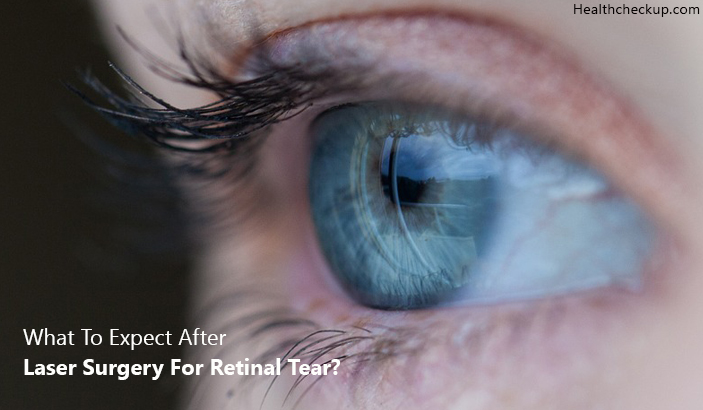Any person who has been diagnosed with a retinal tear is usually advised to undergo a laser surgery for its repair. Surgery can create potential anxiety and curiosity and patients generally ask questions as to how long the procedure takes, recovery time and what to expect after laser surgery for a retinal tear.
What is Retina?
The retina is a thin, delicate and transparent membrane. It is the innermost covering of the eyeball. The retina is rich in nervous supply and receptor cells called Rods and Cones which are highly sensitive to light.
Rods and cones enable colour vision and ability to see in dim light. They receive light stimuli and convert them into nerve signals. Nervous signals are then sent to the brain for visual recognition. Since the retina is such an important structure for normal vision, any damage to it can result in visual disability or even permanent blindness.
What Is Retinal Tear?
The sensory portion of the retina (containing rods and cones along with blood vessels and nerves) is loosely attached to the outermost layer called the pigment epithelium. There is potential space between the two layers and separation of the retina from this layer is known as a retinal tear or retinal detachment or separation.
Retinal Tear or Detachment is of The Following Types
| Types of retinal detachment | Description |
| Primary retinal detachment (Rhegmatogenous retinal detachment) |
It is associated with a break (tear or hole) through which the sub-retinal fluid seeps in and separates a sensory portion of the retina from the outermost layer, pigment epithelium.
There is no specific cause for primary retinal tear. Some pre-disposing factors include:
Signs and Symptoms Include:
|
| Secondary Retinal Detachment
This includes two types:
|
Exudative or Solid Retinal Detachment:
It occurs when the retina is pushed away by a tumor or due to an accumulation of fluid below the retina due to an inflammatory lesion. An absence of folds, tears or holes differentiates it from a primary retinal tear. Causes For Exudative Retinal Tear Are:
Exudative retinal tear due to exudates (pus) or blood usually improves spontaneously following absorption of fluid. Tractional Retinal Detachment: This occurs when the retina is mechanically pulled due to contraction of fibrous tissue. Causes For Tractional Retinal Tear Are:
|
[Read – Essential Medical Checkups You Must Know]
What To Expect After Laser Surgery For Retinal Tear?
Patients with retinal detachment are required to undergo surgery urgently. In order to repair a retinal tear, your ophthalmologist may advise you to undergo a laser surgery called retinopexy or retinal laser photocoagulation.
Recovery period for retinal laser surgery is up to 3 weeks. Patients are mostly allowed to go home on the same day as that of the surgery while some patients may be required to stay in the hospital for a day or two following surgery.
You Can Expect The Following After Laser Surgery For Retinal Tear
- There may be a slight discomfort in the affected eye for a few weeks after surgery. The duration of discomfort or eye discharge will depend upon the type of laser surgery you are required to go under.
- There may also be some amount of bruising present around the affected eye.
- You may experience some sticky eye discharge for up to a few days following laser surgery.
- To prevent discomfort and infection, your ophthalmologist will prescribe you a set of antibiotics as well as eye drops to use.
- These surgeries do not provide instant relief from dark spots, floaters or flashes of light. It is normal to experience floaters after surgery. It takes few weeks or even a month after laser surgery for floaters to disappear.
- There are generally no restrictions for watching television or reading after laser surgery for a retinal tear.
- You can resume daily routine activities and sports or exercises can be continued once your eye has healed completely which varies from person to person.
- Contact sports such as martial arts and kick-boxing, however, are to be avoided.
- Travelling is to be avoided until the air bubble (if used) does not disappear or becomes small. This is because any change in altitude can cause the gas bubble to expand.
- You will be expected to go for a follow-up visit with your surgeon a week after your laser surgery
- To enable uncomplicated recovery from laser surgery, positioning is extremely important.
- A specific position of the head is to be maintained for up to 5 days after surgery when the gas bubble is used.
- You are not allowed to sleep face up because the gas bubble may move and exert pressure against the lens.
Untreated or unsuccessfully treated retinal tear can lead to permanent loss of vision. It is therefore important first to recognize retinal tears early and get them treated. Postoperative care also greatly impacts the healing process and recovery.
Dr. Himanshi is a Homoeopathic consultant and currently working as a lecturer in Post-graduate faculty of Homeopathy, Parul University, Vadodara. Completed BHMS and MD in Homeopathy in January 2018 and also has a clinical experience of about 6 years. Personal interests include reading, spending time with family and traveling.









